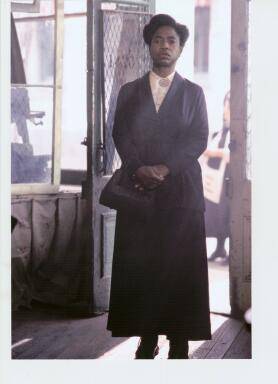| January 26, 2004 | ||
QUEEN PUBLICITY
550
W. REGENT STREET, UNIT 341 Telephone:
(310) 674-1776
|
||
| NEWS | ||
|
January 26, 2004 Contact: Allison Queen FOR IMMEDIATE RELEASE
|
 |
 |
Adilah Barnes as Ida B.
Wells in “Iron Jawed Angels”
(Hollywood, Calif.) - In
celebration of Black History month (February) award-winning stage and film
actor Adilah Barnes will play the powerful and poignant character of Ida
B. Wells, in HBO’s television film IRON JAWED ANGELS, premiering
February 15, 2004 at 9:30 p.m.
Selected and screened five times in January, 2004 as the “Official
Selection” at the prestigious Sundance Film Festival in Utah, IRON JAWED
ANGELS recounts for a contemporary audience an important chapter in U.S.
history. In this case, the film chronicles the struggle of suffragists
who fought for the passage of the 19th Amendment. The film
shows how these activists broke from the mainstream women’s-rights
movement and created a more radical wing, daring to push the boundaries of
political protest to secure women’s voting rights in 1920.
Women had no vote, no political clout, no equal rights but, what they lacked
under the law they made up for with brains, determination and courage.
Starring Hilary Swank (as Alice Paul), Angelica Houston (as Carrie Chapman
Catt) and Frances O’Connor (as Lucy Burns), IRON JAWED ANGELS is an
inspirational true story of two women who dared to make a stand for
women’s rights, and ended up shaping the future of America.
Being cast to play the momentous role of Ida B. Wells was more than
befitting for Barnes, who portrays seven historical figures (Sojourner
Truth, Harriet Tubman, Mary McLeod Bethune, Zora Neale Hurston, Lorraine
Hansberry, Angela Davis and Maya Angelou) in her nationally touring
one-woman show “I AM THAT I AM: Woman, Black.”
”From the moment I was called in to audition for the role of Ida B. Wells,
I was absolutely thrilled with the possibility of portraying such a
significant historical figure. Not only that, it seemed fitting for
Ms. Ida B. Wells to embody me as much so as the other seven historical women
I portray in my solo show. I cannot fully convey the feelings of
homage and exhilaration,” states Barnes.
I experienced from the moment I began my research on Ms. Wells to when the
cameras cut for the very last time.”
Although the protagonists have different personalities and backgrounds, they
are united in their fierce devotion to women’s suffrage. In a
country dominated by chauvinism, this is no easy fight, as the women and
their volunteers clash with older, conservative activists and battle public
opinion in a tumultuous time of war, not to mention the most powerful men in
the country, including President Woodrow Wilson (Bob Gunton). Along
the way, sacrifices are made: Alice gives up a chance for love, and
colleague Inez Mulholland (Julia Ormond) gives up her life.
The women are thrown in jail, with an ensuing hunger strike making headline
news. Their resistance to being force-fed earns them the nickname
“The Iron Jawed Angels.” However, it is truly their wills that are
made of iron, and their courage inspires a nation and changes it forever.
History of Ida B. Wells : Ida B. Wells, (1862-1931) was born in
Holly Springs, Mississippi, months before the signing of the Emancipation
Proclamation. She was the oldest of eight children. When her
parents died in 1880 as a result of a yellow fever plague in Holly Springs,
Wells became a teacher in Holly Springs in order to support her younger
siblings. In spite of hardship, Wells was able to complete her studies
at Rust College and in 1888 became a teacher in Memphis, Tennessee.
While living in Memphis, Wells became an editor and co-owner of a local
black newspaper called “The Free Speech and Headlight.” She wrote her
editorials under the pen-name “Iola.” When a respected black store
owner and friend of Wells was lynched in 1892, Wells used her paper to
attack the evils of lynching and encouraged the black townsmen of Memphis to
go west.
While attending an editor’s convention in New York, Wells received word
not to return to Memphis because her life would be in danger. Wells took her
cause to England to gain support and earned a reputation as a fiery orator
and courageous leader of her people.
Upon returning to the United States, she settled in Chicago and formed the
Women’s Era Club, the first civic organization for African-American women.
The name was later changed to the Ida B. Wells Club in honor of its founder.
She never forgot her crusade against lynching, and, in 1895 Wells published
“A Red Record,” which recorded race lynching in America.